- Visual Studio Code
- Code::Blocks
- Eclipse CDT
- CLion
- C++Builder
- CodeLite
- Kite
- Qt Creator
- Sublime Text
- Dev-C++
10 Best C++ IDEs That Developers Mention The Most!
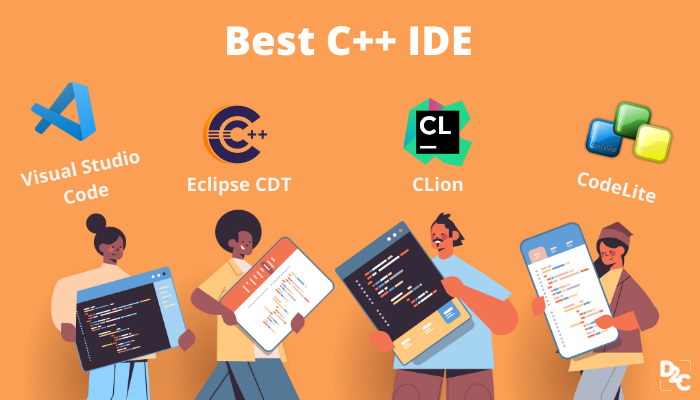
In the days preceding the rapid evolution of computer science and technology, making software or any application was a huge and complex errand, and an engineer had to battle a ton from preparing the outline and coding to dry-running the code and compiling it, followed by Testing, Debugging, Build, and Deployment. All these different build-up stages required a set of different packages and installations. Quite an arduous and time-consuming task, right?
As time progressed and technology made a headway, a single environment to cater to all the individual needs of software development was created - Integrated Development Environment (IDE), which has made the work of a developer quick, efficient, and highly productive.
Also read: 10 best Python IDEs to develop world-class software and application
An Integrated Development Environment, also called integrated development tool or integrated development system, is a computer program that provides an integrated set of tools for authoring, editing, compiling, testing, packaging, deploying, running, monitoring, reporting on, and other aspects of creating, modifying, integrating, distributing, executing, and supporting source code in various programming languages.
This article has thoroughly listed down and explained some of the most significant and best C++ IDEs that are highly recommended by the developer's community.
C++ Overview
Bjarne Stroustrup developed a powerful general-purpose object-oriented programming language - C++. It is packed with all the highlights and hallmarks of the C programming language along with the nuances of Simula67 which is the first Object Oriented programming language (OOP).
- The four primary features of OOP are encapsulated, polymorphism, abstracting, and inheritance. One of the chief languages for the development of all kinds of technical and commercial software is C++, which has all these aspects incorporated. It is commonly used for graphics-heavy software such as games, photo, and video editing apps.
- A multi-paradigm programming language, C++ supports different styles of coding: procedural, functional, generic, etc. The most popular style is imperative or procedural where each line of program executes sequentially from top to bottom. In contrast, functional programs execute statements simultaneously without any sequence. Generic programming allows programmers to write functions that work on many types of data at once.
- C++ IDEs pack all the common developer tools into an exclusive user-friendly Graphical User interface. A source code editor and local build automation are used to compose software programs and develop a local build of the software.
The most popular and some of the best C++ IDEs are Code::Blocks, Dev-C++, Visual Studio.NET. Eclipse, CLion, CodeLite, Qt Creator, Sublime Text, C++ Builder, and Kite.
1. Visual Studio Code
Visual Studio Code is a free open source cross-platform IDE written in JavaScript. This IDE runs on Windows, Linux, MacOSX, and Chrome OS. It comes bundled with many useful plugins, including debugging support, smart code completion, IntelliSense (Completion of Code), refactoring, unit test runner, linting, Git integration, code snippets, etc and much more. You can install it using your favorite package manager.
Visual Studio Code offers you a simple yet effective way to create, edit, debug, run, deploy, monitor, report, and manage applications across multiple platforms. It includes built-in extensions like NodeJS, Python, Ruby, Go, PHP, HTML5, CSS3, TypeScript, Angular2, and React, to name a few.
It is a lightweight, open-source, and free-to-use IDE that also comes with a rich community and Git support.
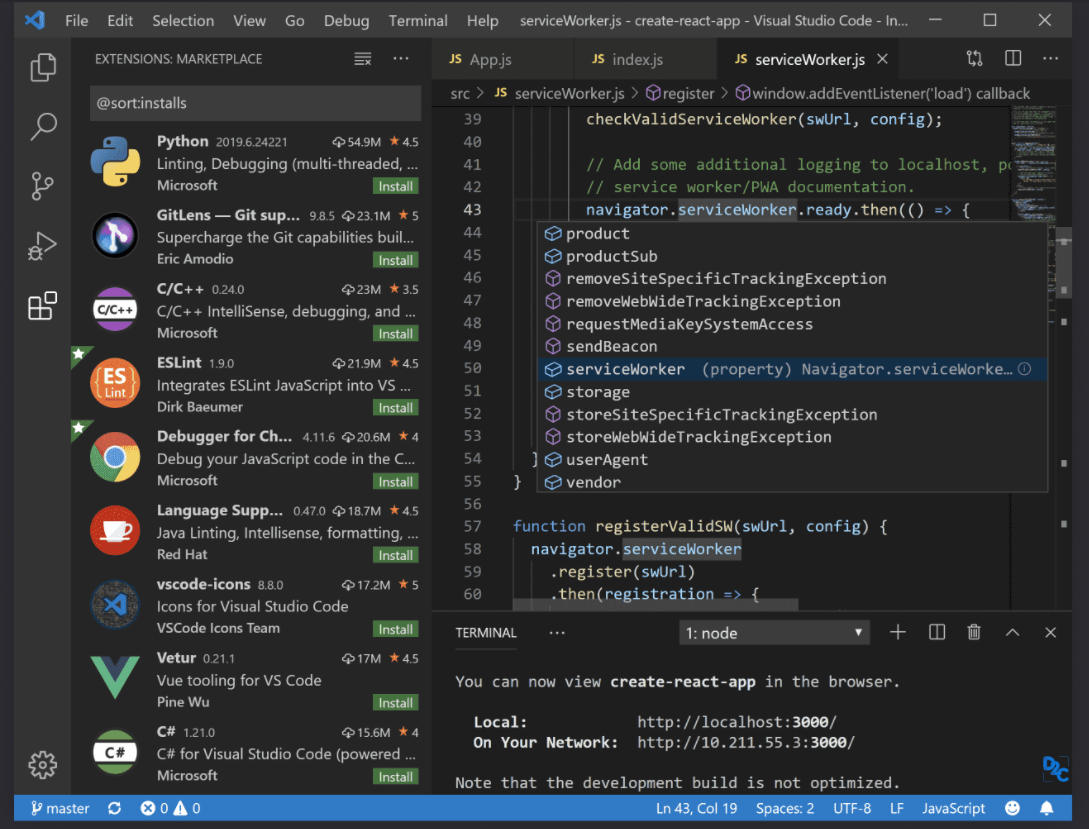
Features of Visual Studio Code - C++ IDE
- Annotations reporting feature permits the developer to separate C# comments and either provide them in HTML or store them in XML documents.
- It's possible to hide minimized documents along the edges of the development environment with the Auto-hide feature, which gets displayed whenever the developer takes the cursor over them.
- Cascading style sheets give full help for making styles that can be applied to HTML or XML components.
- The developer can implore commands within the IDE using the command window tool.
- Upgraded troubleshooting support for C#, C++, and Visual Basic direct in the environment. It also extends support for managed code and remote debugging.
- Deployment tool makes it convenient for the engineer to take benefits of the Windows Installer to convey applications; upholds establishment rollback and application promoting. Merger modules permit the developer to normalize the installation of components for different applications.
- Thanks to the enhanced automation support feature, the software developer has direct access to and control portions of the IDE automatically, like the Code Editor, projects, tools window, and debugging, building along with various deployment tools.
- The developer can also record and play macros directly in the development environment using the Macro-recording feature. Also, this C++ IDE supports all programming languages and permits the engineer to peruse objects in projects and class libraries.
- The start page serves as a personal home page for the developer. NET development and also extends access to news, system updates, downloads, and various documentation. What's more? Tabbed documents permit the engineer to work on multiple windows in a single screen area.
- You can display the web pages directly in the development environment by making use of the web browser feature!
Whatever feature or highlight Microsoft does exclude is frequently given by a noteworthy assortment of accessible Visual Studio extensions such as Visual Assist, Code Runner, CodeMaid, and ReSharper C++, to name a few.
2. Code::Blocks
If you're looking for something free, open-source, cross-platform, and lightweight, which can be used on multiple platforms, build in C++ by wielding a GUI widget tool called “wxWidget”- then go ahead and try out Code::Blocks.
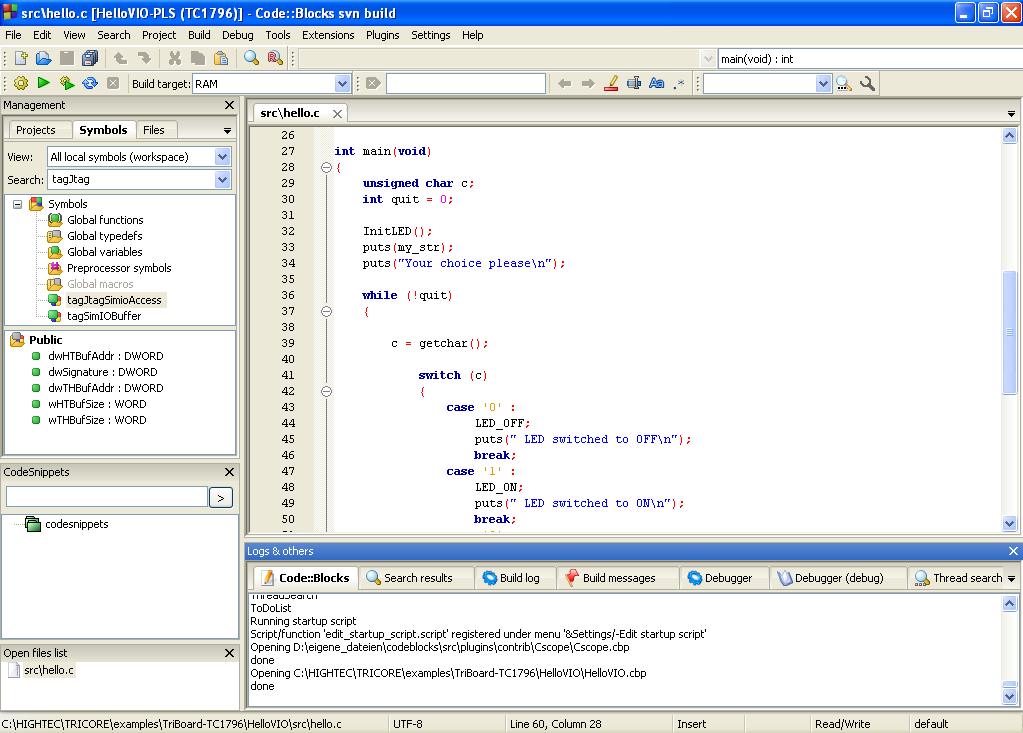
Source: Code::Blocks
Code::Blocks has an integrated debugger that can be used to debug your code while you write it. This makes debugging much easier than using gdb or other external tools. You don't need to compile with -g option to use this feature. The only thing that needs compiling with -g option is when you want to see all global variables.
It’s famous amongst the developers for delivering outstanding performance and boasts of an intuitive interface and also permits you to write in full breakpoints. Other notable feature set includes code refactoring, profiling, auto-code compilation, code coverage, code analysis, drag and drop, tabbing feature, etc. On top of this, you can enjoy a great ecosystem of plugins!
Features of Code::Blocks
- Compatible with Linux, Mac, Windows (utilizes wxWidget).
- It is written in C++. Interpreted programming languages or proprietary libs are not required.
- It is readily extensible through plugins and is a free-to-use IDE (No hidden costs).
- Comes with multiple compiler support and is customizable.
- It halts the execution of code if the expression is true (thus enable the user to write full breakpoint conditions).
3. Eclipse CDT
Another one of the best C++ IDEs in the rundown that comes with rich and active community support is Eclipse CDT. It is an open-source IDE that can run on Windows, macOS, and Linux and has a very simple GUI, and hence is beginner-friendly. It is available both as a plugin and a standalone edition.
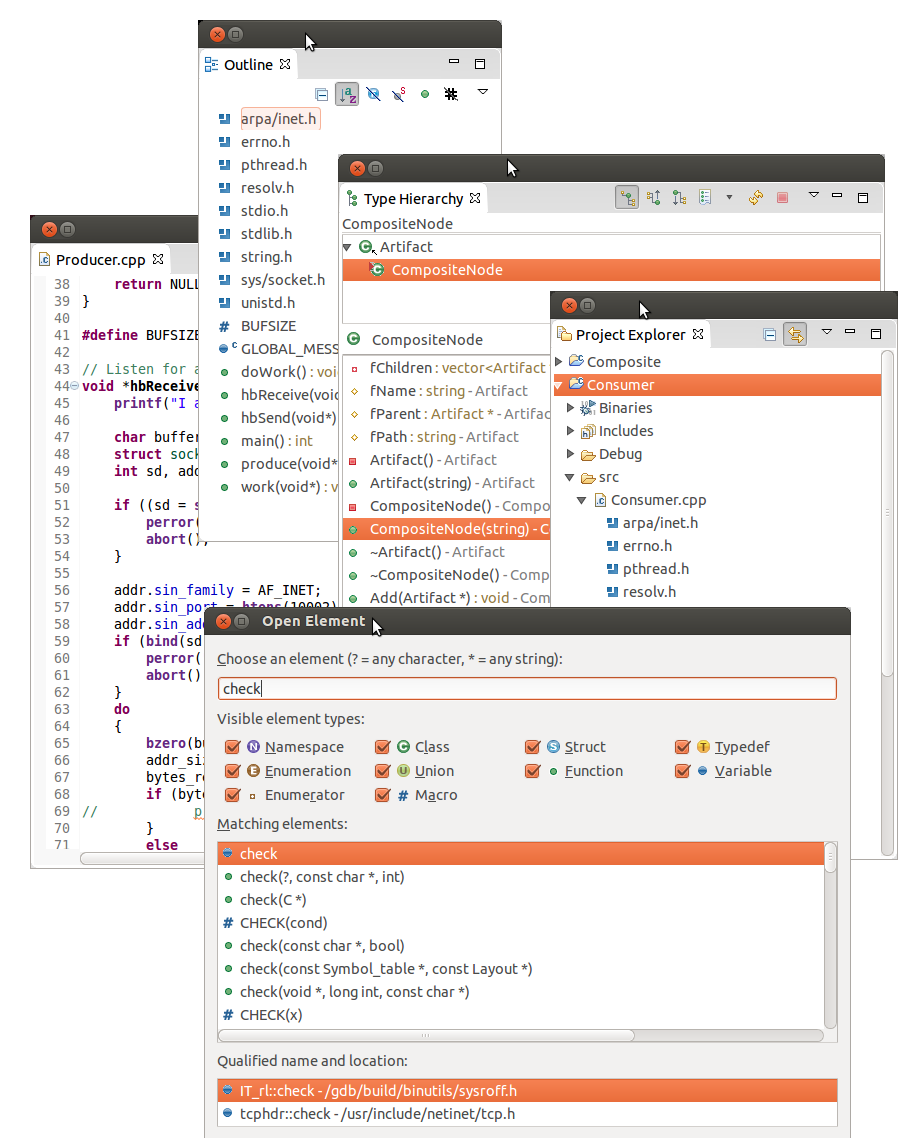
Source: Eclipse CDT
Features of Eclipse CDT
The developer can easily create new files from templates, edit existing ones, add comments, format source code, etc. Eclipse CDT includes many features like:
- Syntax highlighting and coding shortcuts (Contains some really awesome readymade code templates!)
- Indentation and autocorrection
- Error checking and refactoring
- Project management, diffing files, and organizing reports
- File browsing and deployment
- Debugging and profiling
- Optimizing and formatting source codes
4. CLion
JetBrains' CLion is a commercial cross-platform and open-source code editor IDE for C/C++. JetBrains has a loyal following of developers that love their excellent code editors and Code Refactor tools. CMake support, project modeling, and code assistance are included in CLion. You can quickly solve errors in the program with it. It's easy to analyze the performance of your application with this tool and can test individual units of source code.
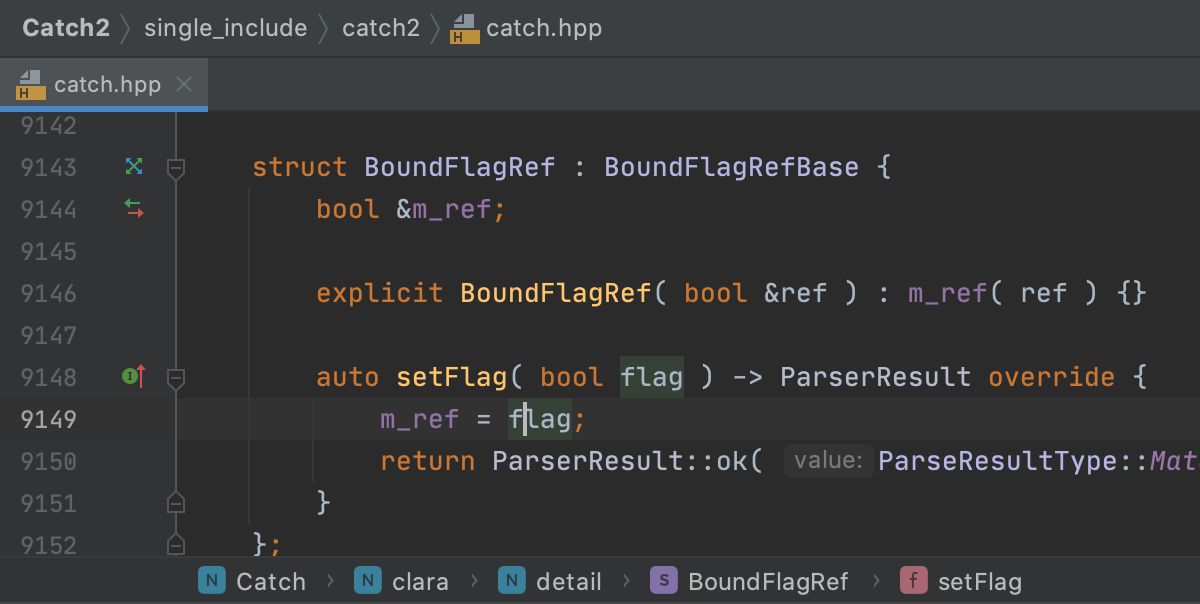
Source: CLion
Features of CLion
- It's easy to begin a new project.
- There is a smart auto-code completion feature.
- You write code and it automatically sets the formatting.
- You can easily compile, run and debug your program.
- Refactoring
- You can use smart code analysis to test individual units.
- The editor can be tailored the way you want.
- There is a built-in set of tools.
- It is possible to easily integrate CLion with other systems such as CVS (Concurrent Versions System) and TFS (Team Foundation Server).
CLion has local and remote (via SSH) support, which allows you to code on your local machine but use a remote server to do the work- one of the very few C++ IDEs to have this feature.
5. C++Builder
Another one of the most popular and best C++ IDEs is C++Builder - a full-highlighted system for building Windows applications multiple times (4-5 times) quicker than with other IDEs due to the rich visual structures and far-reaching libraries, prototyping, developing, and delivering are a piece of the cake with C++Builder.
Features of C++Builder
- It upholds you throughout the full development lifecycle to convey a solitary source codebase that you basically recompile and redeploy.
- Consists of an enhanced Clang-based compiler, Dinkumware STL, and software packages like Boost and SDL2 in C++Builder’s package manager, etc.
- It allows quick integration with continuous build configurations with MSBuild, CMake, and Ninja support either as an individual developer or as a feature of a group.
- Thanks to FireDAC's high-speed direct access feature, you can interface locally to almost 20 databases like MariaDB, Oracle, SQL Server, Postgres, and more.
- What's more? C++ Builder is a powerful code editor that incorporates the honor-winning VCL structure for elite native Windows applications and the amazing FireMonkey (FMX) system for cross-stage UIs.
6. CodeLite
CodeLite is a free, open-source C++ IDE, specialized to run on various platforms (Cross-platform) such as Windows, macOS, Linux. It also provides many features and functionalities as any C++ IDE.
Features of CodeLite
- Code compiling
- Full Visual Studio Support
- IntelliSense and auto code completion tool feature
- Syntax highlighting and you can customize syntax colors.
- Code Refactoring
- Documentation generation
- Support for all major compilers including GCC, VC6, VC7, VC8, VC9, MinGW32, Cygwin, Intel Compiler, GNU G++ 4.x, Sun CC 5+, Borland C++ 6+ and Microsoft Visual C++ 7+
- Source control management
- Project management
- The integrated and interactive debugger
- Unit testing framework
CodeLite is indeed an amazing code editor that can be used with Cscope integration to search a code, and this online tool helps you find files easily using a tree view. It has a command palate that holds functions like sorting, and it is one of the best C++ IDEs.
7. Kite
Kite software is a free-of-cost IDE based on ML models that are trained on more than 25 million files, which assists you in quick code completion that is aware of the context of your code. This code editor upholds more than 16 programming dialects.
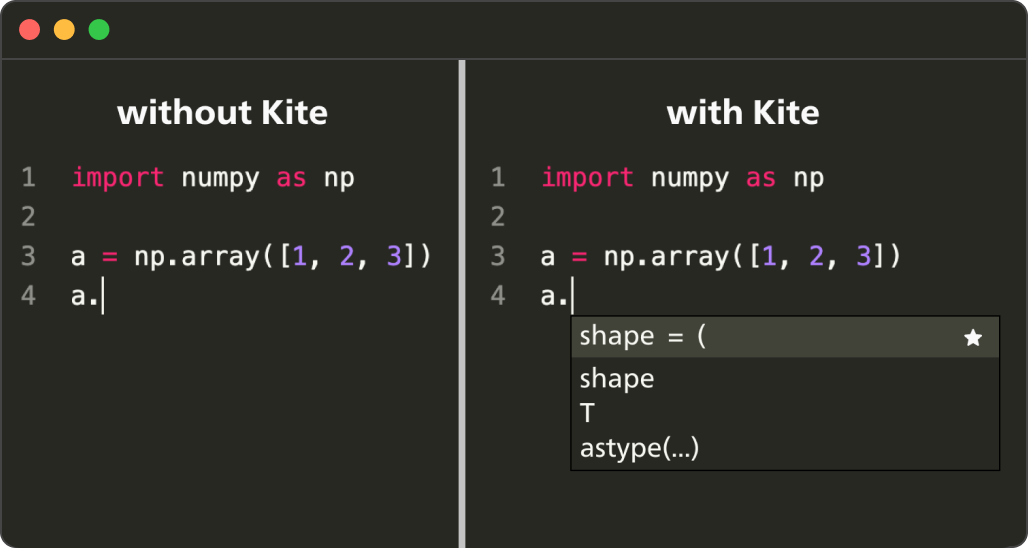
Source: Kite
Features of Kite
- It offers Java documentation
- The code editor provides a function signature as you type your code
If you want to see where something is defined, simply hover over it to view the tooltip - Provides assistance and support over email
- Utilization of ML models for Java language
According to the company, developers can program with ease and save up to 47% of their time during development.
The Kite artificial intelligence engine can be used as an add-on to other popular code editors, such as PyCharm, IntelliJ, Atom, Visual Studio Code, and Sublime, to name a few.
8. Qt Creator
The popular and feature-filled Qt toolkit can be used to build superb GUI applications using the commercial (with free trial) C++ cross-platform IDE - Qt Creator
Features of Qt Creator
In addition to the usual development tools, such as Compiler, Debugging, Code Completion, Profiling, and Refactoring, Qt Creator developers also benefit from a vibrant suite of design and development tools and design tools (Qt Toolkit- such as Qt Design Studio, Qt 3D Studio, Qt Quick Designer, Qt QmlLive, Gamma Rays, Emulator, Qt Creator, Qt Linguist, and so on.)
9. Sublime Text
You can use a code editor like Sublime Text for many programming languages. It is a full-featured C++ IDE and a very fast text editor, with a simple UI. This software is very easy to use and has been designed to be fast, light-weight, extensible, customizable, and cross-platform (Windows, macOS, and Linux).
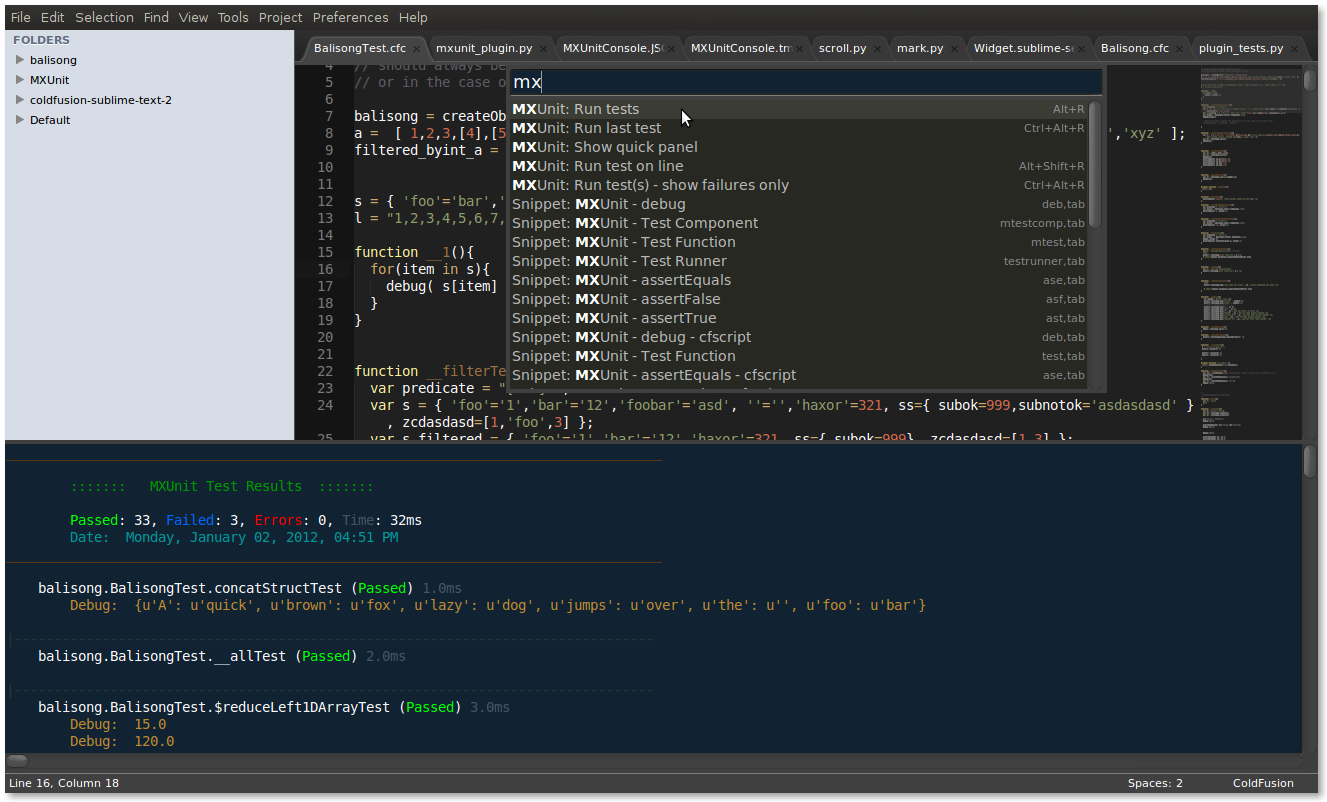
Source: Wikimedia Commons
Features of Sublime Text
- Syntax highlighting
- Goto anything
- Goto definition
- Command palette
- Multiple selections
- Powerful API
- Split editing, and instant project switch.
However, the need to learn shortcuts and the requirement of a license ('free trial' version) can be counted as some of the disadvantages of Sublime Text.
10. Dev-C++
Developed by Borland Software Corporation, Dev-C++ or Dev-Cpp is a very good C++ compiler and integrated development environment. It was originally designed for developing embedded systems. But now it is widely used for creating desktop applications and for Mobile App Development as well!
Features of Dev-C++
- Its main advantage over other C++ IDEs is that it provides a complete set of facilities for compiling, linking, building, testing, debugging, profiling, optimizing, and deploying projects.
- What's more? It provides customizable syntax highlighting editor, indentation, error checking, project management, file browsing, and other essential components required for developing large-scale projects. It also contains various libraries and compilers for building native executables.
- International language support, a tool manager, find and replace options, and code printing is also included, along with an integrated debugger (via gdb).
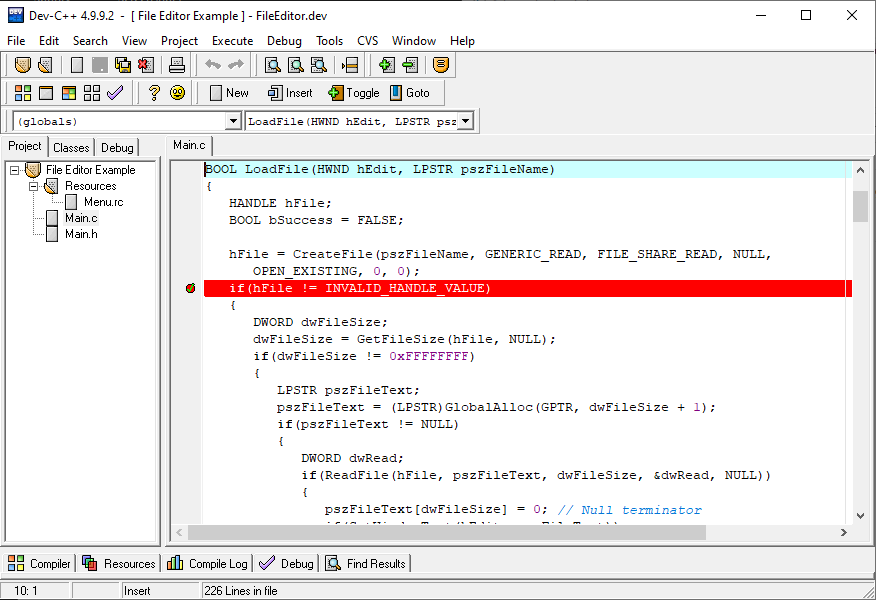
Source: Dev-C++
It works well with Microsoft Visual Studio 6.0 and later versions. So, if you are working on the Windows platform, there is no reason to miss this tool. Despite its limitation of only supporting the Windows Operating system, Cygwin and MinGW are some of the GCC-based compilers it supports.
Summing up...
There are many different situations in which software developers use multiple IDEs. A Windows-centered development project may be better served with Visual Studio, while a macOS application might benefit from XCode. If you are a JetBrains user, CLion is an obvious choice. It has good integration with other JetBrained tools and has a similar user interface and workflow. Qt developers will naturally lean towards Qt Creator. Cross-platform projects using the wxWidget toolkit will benefit just as much as independent projects such as CodeLite.
However, experts recommend using one single IDE for all your needs. If you have already invested time learning another IDE, then stick to it until you feel comfortable enough to move onto something else.
Dig deep into the world of coding with these articles:
Login to continue reading
And access exclusive content, personalized recommendations, and career-boosting opportunities.
Subscribe
to our newsletter
Blogs you need to hog!

This Is My First Hackathon, How Should I Prepare? (Tips & Hackathon Questions Inside)
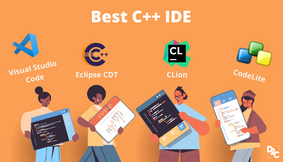
10 Best C++ IDEs That Developers Mention The Most!
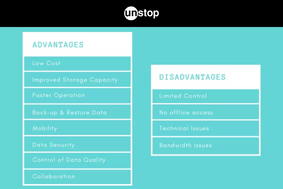
Advantages and Disadvantages of Cloud Computing That You Should Know!











Comments
Add comment